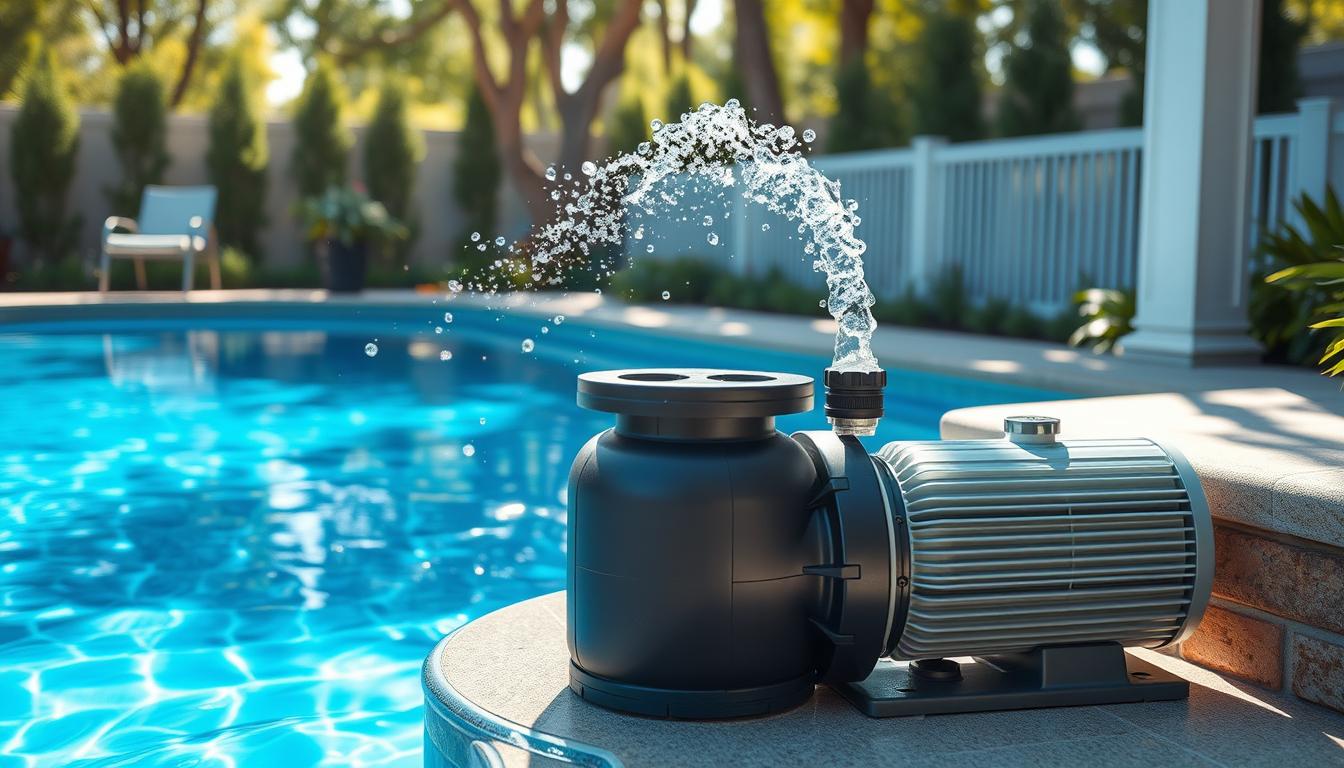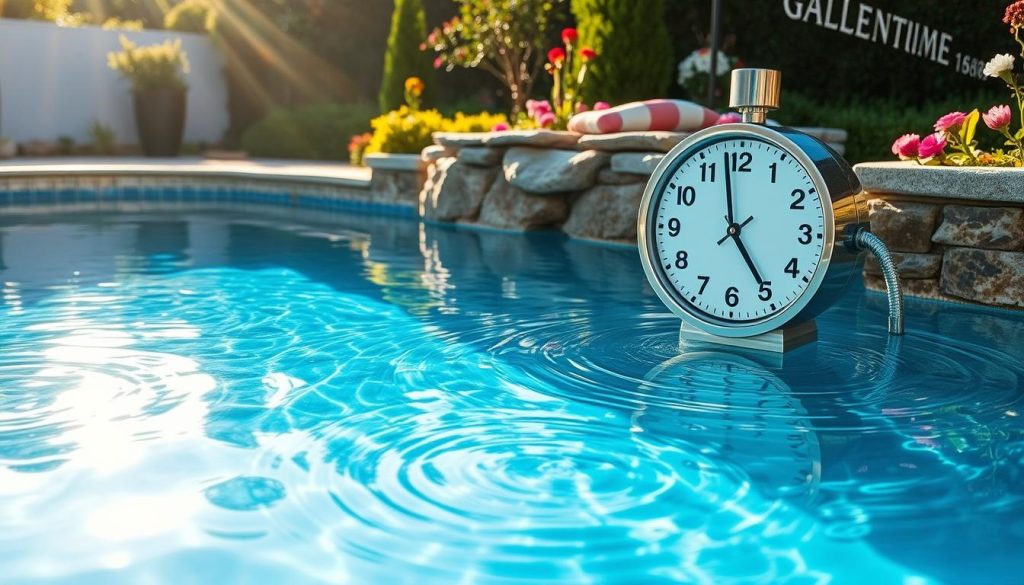
Variable speed pool pumps can save up to 83% energy yearly compared to single-speed pumps. Pool owners want clean water and low energy costs. Determining the right filter runtime is key to this balance.
This guide explores factors affecting pool filter runtime. We’ll provide tips to keep your pool in top shape.
Key Takeaways
- The recommended daily operation time for a pool pump is approximately 8 hours, with variations based on factors like turnover rate, pump flow rate, and pool usage patterns.
- Household pools are suggested to have a turnover rate between 6 and 8 hours per day to maintain water quality.
- During summertime, it is advised to complete at least two full circulations within 24 hours to prevent algae growth.
- Larger pools may require longer filtration times to circulate all the water effectively.
- When adjusting pool pump running times for seasonal changes, it is crucial to prevent algae buildup and maintain water clarity throughout the year.
Understanding the Basics of Pool Filtration
Efficient pool filtering keeps your pool clean and inviting. It relies on your pool pump and filter working together. These components circulate and purify the water, maintaining crystal-clear conditions.
Understanding key factors helps optimize filter runtime. This knowledge promotes equipment longevity and ensures pristine water quality. Let’s explore the essential elements of pool filtration.
The Role of Your Pool Pump and Filter
Your pool pump is the heart of the filtration system. It circulates water through the filter, removing debris and contaminants. The filter traps particles and impurities, ensuring clean and safe swimming water.
Pump power and filter efficiency determine ideal operation hours. Together, they keep your pool in top condition. Different filter types include sand, cartridge, and diatomaceous earth (DE).
Factors Influencing Optimal Filter Runtime
Several factors affect efficient pool filtering duration. These include pool size, bather load, climate, and filtration system efficiency.
| Factor | Impact on Filter Runtime |
|---|---|
| Pool Size | Larger pools generally require longer pump runtimes to achieve complete water turnover. |
| Bather Load | Higher bather loads introduce more contaminants, necessitating increased filtration time. |
| Climate | Hotter climates may demand longer pump runtimes to prevent algae growth and maintain water balance. |
| Filtration System Efficiency | High-efficiency filters may require shorter runtimes compared to less efficient models. |
Balancing these factors determines your pool filter daily runtime. Aim for one complete volume turnover every 4-6 hours. For example, a 70,000-liter pool needs 5.5-6 hours of filtration.
Tip: Consider upgrading to a variable speed pool pump for longer pump runtime, cost savings, and energy efficiency. These pumps allow you to fine-tune your pool filter scheduling to meet your specific needs while minimizing energy consumption.
Understanding pool filtration basics helps develop an efficient filtering schedule. This keeps your water clean and extends filter lifespan. Next, we’ll explore calculating ideal filter runtime for your pool.
Determining the Ideal Pool Filter Runtime
Clear pool water needs proper filtration and circulation. Finding the right pool filter runtime is key. This guide will help you keep your pool clean all season long.
General Guidelines for Filter Operation
Most experts suggest running your pool filter for at least 6 hours daily. The best range is usually 8 to 12 hours per day. This ensures complete water turnover and removes dirt and contaminants.
Pool size, usage, and environment can affect ideal filter operation times. Keep these factors in mind when setting your filter schedule.

Calculating Your Pool’s Turnover Rate
To find the best runtime, calculate your pool’s turnover rate. This is how long it takes to circulate all the water. Aim for a turnover rate of once every 6 to 8 hours.
Divide pool volume by pump flow rate to get the turnover rate. For example, a 20,000-gallon pool with a 50 GPM pump has a 6.7-hour turnover rate.
| Pool Volume (gallons) | Pump Flow Rate (GPM) | Turnover Rate (hours) |
|---|---|---|
| 10,000 | 40 | 4.2 |
| 20,000 | 50 | 6.7 |
| 30,000 | 60 | 8.3 |
| 40,000 | 70 | 9.5 |
Adjusting Filter Runtime Based on Pool Usage
Adjust your filter runtime based on pool use and conditions. Increase runtime during peak seasons or after heavy use. This helps maintain good water quality.
Consider extending pump timer settings for pools exposed to rain, debris, or lots of sunlight. These factors can add more contaminants to the water.
Watch your pool’s condition closely and adjust filter cycles as needed. This helps balance energy use and water quality.
How Long Should a Pool Filter Run for Optimal Performance?
Pool filters need to run for 6 to 12 hours daily. This ensures clean, clear water while being energy-efficient. The runtime depends on pool size, usage, and specific needs.
Different filter types have varying maintenance needs. Sand filters need changes every 3-7 years. Cartridge filters require replacement every 3-5 years and regular cleaning. DE filters need monthly backwashing and DE addition.
Proper upkeep extends filter life and boosts energy efficiency. This reduces energy use and lowers utility bills. Start with the 6-12 hour range and adjust based on water clarity.
Running the pump during off-peak hours can save money. A variable speed pump offers better control over speed and runtime. Solar-powered systems can allow all-day filtration without high electricity costs.
Regular maintenance and optimized runtime keep your pool inviting. Clean filters promote pool health and appearance. They also improve energy efficiency and lead to long-term cost savings.







